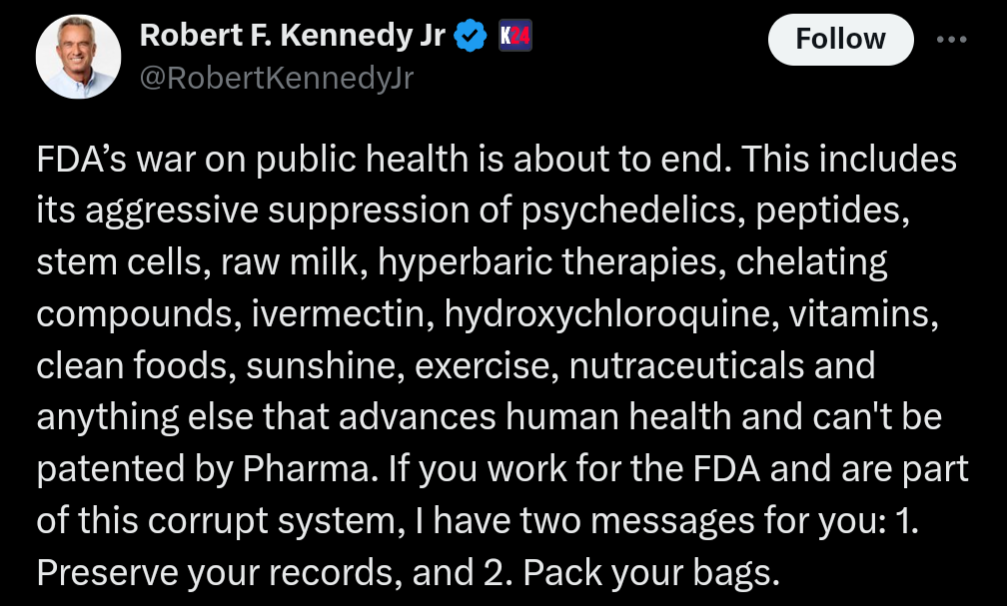He kept his two income streams tied together, so that when one ran into trouble it took the other one down with it. He could have just as easily kept the business separate and potentially been able to keep one of the income streams working when the shit hit the fan.
Depends on what he means by "ultra-processed", but you can bet that it's probably not a reasonable criteria that he'll be using.
The man isn't rational, and doesn't base his conclusions on sound reasoning.

Note the call to lessen regulations around "raw milk, chelating compounds, ivermectin, hydroxychloroquine". That's pretty insane.
And I can almost be certain that what they'll do is eliminate funding for snap benefits and school lunches going to what they'll classify as "ultra processed foods", without adjusting funding to account for what they left behind being significantly more expensive. Some definitions of "ultra-processed" include things like "store bought bread", "frozen meals", "soup concentrate", "yoghurt" and "sausage".
Call me cynical, but I think if you apply the stricter work requirements for benefits they always want, while reducing the scope of the benefits to cover fewer things, and almost nothing helpful for the people with the severe time restrictions the work requirements can cause you'll end up seeing people use the benefits far less often, because they give less usable food for the money. Then they'll use that to justify reducing the size of the program even further.
We expect people making school lunches to make hundreds of meals that finish at the same time, to have the meal be nutritionally complete, tasty, and now also not use frozen or premade ingredients. We give them literally $1 for the ingredients for these meals, and maybe another $2 for operational overhead like labor costs and equipment.
Saying you can't use canned tomato sauce, peanut butter, pre-packaged bread or ground meats is basically just cutting funding for feeding children under the guise of not paying for a scary sounding classification of food.
Ha! I didn't see that at first. I love "fuck you so hard that we can and will put a significant dollar value on it being more humiliating".
The assets were auctioned off to pay his debt to the families of the Sandy Hook shooting.
So effectively they gave money to the families of children killed in a school shooting that he slandered in cruel and vile ways.
Given that the families pretty reasonably dislike him, the added bonus of his creation being used to openly mock him and promote a message they endorse is quality icing on the cake.
His supplement business was under the same business ownership? That's preposterously stupid and hilarious.
I can actually forgive this one. A lot of medical devices regulations require that if you function as something or make it available, then you need to pass the certification for offering it.
You can't just relabel a device as something else if you clearly intend for it to be used as a medical device. Shady Bob's emergency electrical heart massager isn't going to fly.
In the US, hearing aids required a prescription until 2022. What I can glean from translated sites is that India still has that requirement.
Lives in the same building for one of the examples given. And we're not DAs, we get the benefit of OP telling us their state of mind and intent which involves very explicitly making choices of dress, behavior and demeanor for the explicit purpose of quite literally menacing women for his own amusement.
Difficult to prosecute doesn't make something legal.
Depends on jurisdiction, but in a fair number it would be "menacing".
A person is guilty of menacing when by some movement of body or any instrument the person intentionally places another person in fear of imminent physical injury.
That's Delaware's, but different states do it differently, and some out that classification under stalking.
Following someone around intentionally and knowingly causing them fear of injury is illegal. Why on earth would you even for a moment think you're allowed to do that? It's like thinking guns are legal so you can point your gun at someone on the street.
There's none. They would owe him money, so he'd have to get in line with all the other creditors to request that the court prioritize his debt over someone else's.
https://www.msnbc.com/msnbc/amp/rcna161562
There's a massive difference between the social stigma attached to coming out, and the revocation of the legal rights associated with marriage.
It's not even that long ago that people couldn't visit their life partner in the hospital following an accident, because they weren't married.
Limited access to certain types of contraception in certain areas is a very different beast than overturning the case that ruled that contraception isn't criminally indecent.
If you don't know how far civil rights have come even in the past 20 years, or how much further back than that they openly want to push things back, I don't think you're paying attention.
Abortion had just as much legal protection as porn or gay marriage, and it "wasn't going anywhere" until it was suddenly gone.
What have they got to lose?
Gay marriage, contraception, porn, legal divorce? Just off the top of my head.
While true, it's kinda tangential here, no?
If you suddenly disappear with no markers of violent crime, it's unlikely they're going to jump to charging someone with murder on the grounds of "you were once extremely insensitive and rude to her".
The notion of getting a special edition white one, then swapping the shell to a custom black is funny.
Right? Like, four years ago we had to shutdown big chunks of the world, inject trillions of Dollars of money into circulation to keep things vaguely moving, millions of deaths, logistical and manufacturing delays galore, and people are pissed that we're not better off than we were before. So pissed that they want to take control from the people who have been turning it around and give it back to the people who fucked it up in the first place.
I'm always confused by the need for the Democrats to be more policy specific, when they're the only party that actually shares any policy.
I feel like people aren't saying they're unsure of the specifics of Kamala's policy points, so they're going to instead vote for the guy who rambles incoherently for an hour about evil Mexicans.
I had two premature babies in the NICU (twins with last minute maternal complications, everyone is fine but things were early), and they benefited so much from donor milk.
Newborns in general and preemies in particular have basically no immune system. NICU preemies are also susceptible to a very serious intestinal condition that can cause parts of their intestines to die.
Breast milk is filled with antibodies and various immune response related proteins that help bootstrap their immune system and might essentially prevent the intestinal issue entirely.
Once you're developmentally advanced enough there's no real long term difference between formula and breast milk, but before then the immune compounds we can't make synthetically are basically medicine.
It's a little odd because breast milk seems more intimate than something like blood, but it's arguably more impactful.
What? No, I just like making ice cream and I research my hobbies. Why would you think I hate dairy?
Closest I get is thinking that it's silly to insist that something like oat milk ice cream isn't ice cream.
Those aren't typically used to mask anything, or to let you increase the air quantity. They're typically used to keep the product stable during freezing, otherwise it can either turn into a brick because they froze too solidly, or because all the air escaped during cold storage.
In terms of cost savings, it does let them shorten the time needed to let the mix sit before churning, but that's just because it helps the fat globs come back together easier.
There's nothing intrinsically wrong with using the gums. Xanthan is the only one really that isn't available in an organic formulation, since they're just bean powders mostly.
What's the difference between using coconut oil or pectin like Hagan dazs does (a fat solid at higher temperatures that works as a stabilizer, and a fruit derived gelling agent) and using guar or locust bean gum? They're all just plant powders and roughly equally processed.
It's actually because icecream has a defined air and fat content, and if you leave those guidelines you stop being icecream.
Changed with ice cream in general? No. But there are things that have been possible to add to ice cream for a while that do what you describe. It could be that you're just starting to notice, you shifted brands, or the brand you liked shifted formulations.
Many people dislike the things that get added to ice cream, and so there are definitely brands out there that don't include those things.
In my opinion the worst of the additives is not nearly as bad as a lot of people would make them out to be.
In the broadest sense possible ice cream is sugar, fat, water and thickener where the fat has been cooled to a solid and allowed to just start to re-form into a lump, the ice hasn't been allowed to form crystals big enough to notice, and the thickener and sugars glue the fat and ice together such that they trap miniature air bubbles.
Some people insist that the fat and thickener have to come from cow milk in the form of milk fat and milk proteins, but that's a bit pedantic for my tastes.
The easiest way to cheap out on ice cream is to add a lot more air. Since we sell it based on volume, if we churn more air into it we get more ice cream to sell for the same quantity of ingredients, and the only effect is that the ice cream is lighter, softer and fluffier.
There's a legal maximum to how much air you can mix in though.
The next hurdle you run into is that milk proteins are actually kinda shit at keeping those air bubbles trapped. Adding things like guar gum or carrageenan will make it much gloopier and hold those air bubbles better.
This makes the ice cream last longer in a warehouse without the bubbles getting out and leaving your ice cream as a brick.
Next is rampant ice crystal spread, which can turn the ice cream into a brick in the warehouse. This can be slowed down using something called methylcellulose. It's basically processed plant fiber ground into a powder. It's also used in pills as the inert binder, and as a dietary fiber source.
It's popular because is known to be safe and inert, it's very cheap, it prevents ice crystal formation, and it has the fun quirk of getting thicker as it warms, for the added property of keeping your ice cream fluffy and areated as it warms up on your drive home.
Finally, you can tweak the fat blend. This one isn't as common because milk fat is already insanely cheap since we subsidize the hell out of the dairy industry.
Changing the blend to use fats that are solid at higher temperatures does have utility for things you expect to be eaten slower, at higher temperatures, or if you want parents to not be mad that your ice cream makes kids extra sticky.
By far the biggest way that I've cream will save costs is by putting as much air in it as possible. It lets them sell you less in the same size box for the same price.
It's a case where shrinkflation means making things bigger, which is fun.
The brands that didn't take that route invariably rebranded as "premium" ice creams, so they can charge more for the same thing without raising consumer ire.
Cozy fox drinking tea


crochet fox drinking hot tea, cinematic still, Technicolor, Super Panavision 70
Not quite what I was going for, but super cute regardless.
cat failed to load its texture properly.


Been having fun trying to generate images that look like "good" CGI, but broken somehow in a more realistic looking way.
a fun self portrait I made with control net


> digital illustration of a male character in bright and saturated colors with playful and fun expression, created in 2D style, perfect for social media sharing. Rendered in high-resolution 10-megapixel 2K resolution with a cel-shaded comic book style , paisley Steps: 50, Sampler: Heun, CFG scale: 13, Seed: 1649780875, Size: 768x768, Model hash: 99fd5c4b6f, Model: seekArtMEGA_mega20, ControlNet Enabled: True, ControlNet Preprocessor: lineart_coarse, ControlNet Model: control_v11p_sd15_lineart [43d4be0d], ControlNet Weight: 1, ControlNet Starting Step: 0, ControlNet Ending Step: 1, ControlNet Resize Mode: Crop and Resize, ControlNet Pixel Perfect: True, ControlNet Control Mode: Balanced, ControlNet Preprocessor Parameters: "(512, 64, 64)"
If you take a picture of yourself in from the shoulders up, like in the picture, while standing in front of a blank but lightly textured wall it seems to work best.





